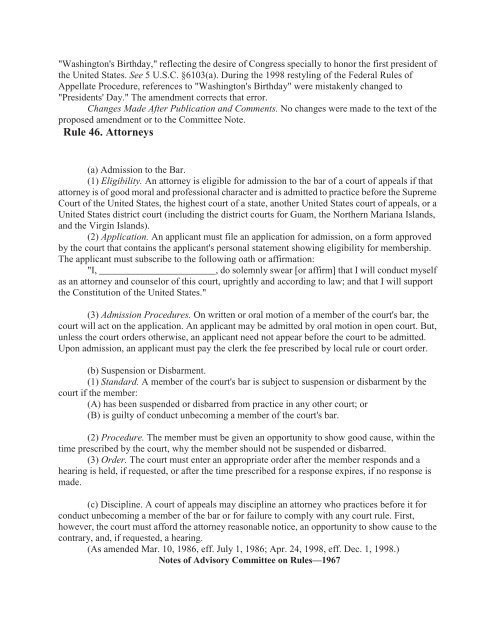Federal Rules of Appellate Procedure 2014-2015, 2014a
Federal Rules of Appellate Procedure 2014-2015, 2014a
Federal Rules of Appellate Procedure 2014-2015, 2014a
You also want an ePaper? Increase the reach of your titles
YUMPU automatically turns print PDFs into web optimized ePapers that Google loves.
"Washington's Birthday," reflecting the desire <strong>of</strong> Congress specially to honor the first president <strong>of</strong><br />
the United States. See 5 U.S.C. §6103(a). During the 1998 restyling <strong>of</strong> the <strong>Federal</strong> <strong>Rules</strong> <strong>of</strong><br />
<strong>Appellate</strong> <strong>Procedure</strong>, references to "Washington's Birthday" were mistakenly changed to<br />
"Presidents' Day." The amendment corrects that error.<br />
Changes Made After Publication and Comments. No changes were made to the text <strong>of</strong> the<br />
proposed amendment or to the Committee Note.<br />
Rule 46. Attorneys<br />
(a) Admission to the Bar.<br />
(1) Eligibility. An attorney is eligible for admission to the bar <strong>of</strong> a court <strong>of</strong> appeals if that<br />
attorney is <strong>of</strong> good moral and pr<strong>of</strong>essional character and is admitted to practice before the Supreme<br />
Court <strong>of</strong> the United States, the highest court <strong>of</strong> a state, another United States court <strong>of</strong> appeals, or a<br />
United States district court (including the district courts for Guam, the Northern Mariana Islands,<br />
and the Virgin Islands).<br />
(2) Application. An applicant must file an application for admission, on a form approved<br />
by the court that contains the applicant's personal statement showing eligibility for membership.<br />
The applicant must subscribe to the following oath or affirmation:<br />
"I, ________________________, do solemnly swear [or affirm] that I will conduct myself<br />
as an attorney and counselor <strong>of</strong> this court, uprightly and according to law; and that I will support<br />
the Constitution <strong>of</strong> the United States."<br />
(3) Admission <strong>Procedure</strong>s. On written or oral motion <strong>of</strong> a member <strong>of</strong> the court's bar, the<br />
court will act on the application. An applicant may be admitted by oral motion in open court. But,<br />
unless the court orders otherwise, an applicant need not appear before the court to be admitted.<br />
Upon admission, an applicant must pay the clerk the fee prescribed by local rule or court order.<br />
(b) Suspension or Disbarment.<br />
(1) Standard. A member <strong>of</strong> the court's bar is subject to suspension or disbarment by the<br />
court if the member:<br />
(A) has been suspended or disbarred from practice in any other court; or<br />
(B) is guilty <strong>of</strong> conduct unbecoming a member <strong>of</strong> the court's bar.<br />
(2) <strong>Procedure</strong>. The member must be given an opportunity to show good cause, within the<br />
time prescribed by the court, why the member should not be suspended or disbarred.<br />
(3) Order. The court must enter an appropriate order after the member responds and a<br />
hearing is held, if requested, or after the time prescribed for a response expires, if no response is<br />
made.<br />
(c) Discipline. A court <strong>of</strong> appeals may discipline an attorney who practices before it for<br />
conduct unbecoming a member <strong>of</strong> the bar or for failure to comply with any court rule. First,<br />
however, the court must afford the attorney reasonable notice, an opportunity to show cause to the<br />
contrary, and, if requested, a hearing.<br />
(As amended Mar. 10, 1986, eff. July 1, 1986; Apr. 24, 1998, eff. Dec. 1, 1998.)<br />
Notes <strong>of</strong> Advisory Committee on <strong>Rules</strong>—1967


















